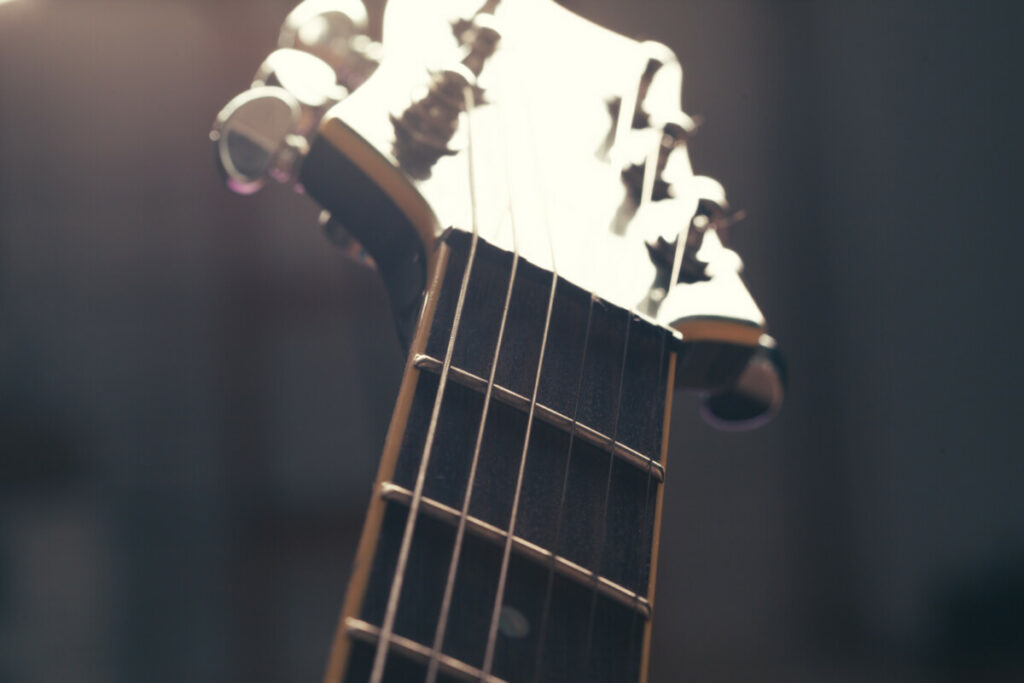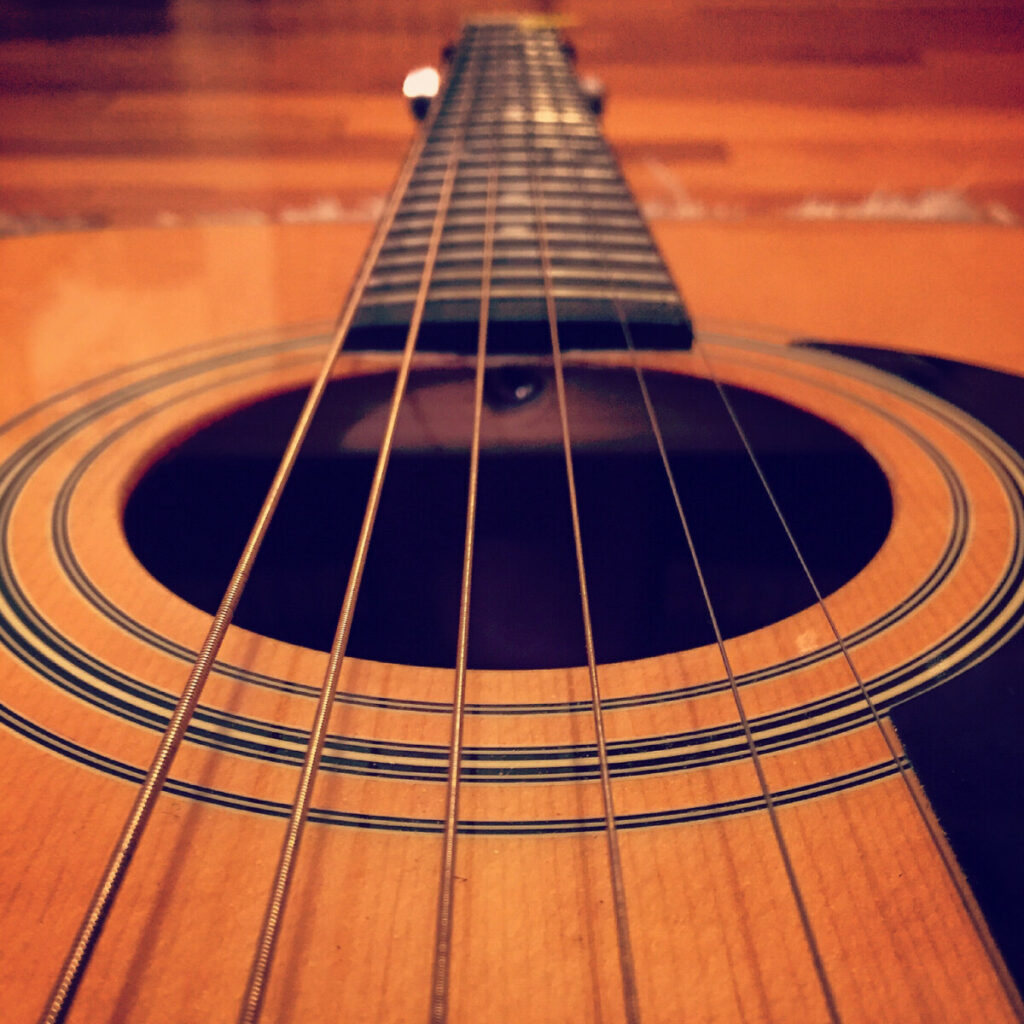Guitars need regular maintenance such as cleaning, changing strings, and so on to keep them in a good condition. So you might be wondering what is the case with frets. How long do guitar frets last? How can you prevent their wearing?
In this article, we go through more details about the lifespan of guitar frets and ways to keep them in a good condition, so continue reading.
Key Takeaways
- The lifespan of guitar frets depends on the material, playing style, string gauge etc.
- Some of the most durable materials are stainless steel and nickel silver.
- Bending the strings and pressing too hard can cause more wear.
- Using capos and slides is bad for the frets.
- Lighter strings cause less pressure, hence less wear.
Table of Contents
How long do guitar frets last?

There is not one answer to this question as guitar frets can last for a few years to, but they can even last for decades. Their lifespan depends mostly on the material they are made of, the thickness of the strings, and your guitar-playing style.
In a way, we can compare guitar frets to car tires. Based on the driving style if you accelerate a lot your tires will wear off faster than those who drive more miles, but smoothly. So with guitar frets, if your playing style is one where you play the strings on the fret harder, it can wear off quicker.
In the following paragraphs, we will go through the factors that make a difference.
Guitar frets material
As we already mentioned, the material from which your guitar frets are made can affect their lifespan. Generally, there are brass, nickel silver, EVO, and stainless steel frets. So which one of these is the most durable material?
Brass frets
Brass frets are not so common as they are soft so they aren’t very durable. You cannot find them on modern acoustic or electric guitars, but there are still classical guitars that might use brass frets.
Nickel silver frets
Nickel silver frets are common and can be found in both acoustic and electric guitars. This material is made of nickel and copper but despite its name, it doesn’t have silver in it.
This nickel-silver material is a great choice for the frets because it offers a good duration so you can expect good use for a few years before it wears out. The material is hard, but it is still soft enough for an easy installation.
Compared to vintage brass frets, nickel silver frets are much better and more durable.
Stainless steel frets
Stainless steel is considered one of the best materials for guitar frets. This material is the hardest compared to the others so stainless steel frets offer great durability. Another good thing about stainless steel frets is that they add brightness to the tones to produce high-quality sounds.
The disadvantages here are that stainless steel frets are hard on the tools and can damage them. Because of this, many producers still prefer nickel-silver frets. Brands where you can find guitars made of stainless steel frets are Ibanez, Suhr, Schecter, and some others.
Evo material frets
Lastly, the EVO material, which consists of copper and titanium, is generally a new way of producing guitar frets, but it is now starting to get more common in guitar production.
The EVO material offers balance as it is between nickel silver and stainless steel based on hardness and tones. This material is harder than nickel silver, but not harder than stainless steel.
Because of this balance, the durability is on point, but at the same time, it doesn’t destroy your fretting tools like the stainless steel material.
Guitar playing style

Another thing that affects your guitar frets is your playing style. This depends on the bending of the strings, whether you use capos and slides and how hard you press.
If you bend the guitar strings while playing, your guitar frets will wear out faster. The bends can cause damage because the string goes over the surface of the fret and exerts pressure.
Bending may cause more damage than plucking a string because when plucking the pressure is on that specific place on the fret’s surface, but when bending the pressure is on the whole fret where the string goes.
Other things that can damage the frets
When it comes to pressing, it is important to keep in mind that if you press harder on the frets as a lot of guitar players do in their playing style, then this will cause more wear to the frets.
Another thing that can damage the frets is using capos and slides. When you put capos on the fretboard to clamp down on the strings, this increases pressure on the particular fret. Because of this tension the more you use capos, the shorter the lifespan of your frets will be.
The same happens with slides. This is because slides add weight to the frets and this increases the pressure which results in the wear of the frets. So if you need to use slides, it is recommended to get good-quality slides that are smooth. You should avoid metal slides as they cause more damage.
String thickness
The gauge of the guitar strings also plays a role when it comes to the lifespan of frets. Simply, heavier strings cause more pressure on the frets, hence more wear. On the other hand, lighter strings cause less pressure and are a better choice to keep the wear of frets minimal.
Humidity and sweat
Humidity can also affect the frets. In low humidity, the neck of the guitar can start shrinking because it is made of wood. While the frets, usually made of nickel or steel, are more resistant to humidity.
In this case, when the guitar neck shrinks, it will cause fret sprouts (sharp fret ends) which make playing uncomfortable. To fix this you can do the sanding.
The sweat from your fingers can also cause wear to the frets, the same way it causes wear to the strings. The moisture will make the frets rusty which is bad for your guitar.
How to prevent guitar frets from wearing?
You can notice that frets need changing if the strings are buzzing, there’s a shorter tone sustain and the pitches sound wrong. But how can you prevent their wear?
For prevention, it is important to first have good material frets. If you are changing your old ones, you should consider putting stainless steel or nickel silver frets as they tend to last longer.
You should try to avoid pressing too hard on the frets, bending the strings, and using capos or slides as all of these things and a harsh playing style affect the frets. Another thing to consider is getting a pack of lighter strings.
You should also keep your guitar in a humidity-controlled place and wash your hands before playing.
Final thoughts
Guitar frets can last for a long time, but it all depends on some key factors and how well you maintain them. In this article, we provided the necessary information on why your guitar frets wear out and how to keep them well for a longer time. By following our tips, you will be able to keep your frets lasting longer.

